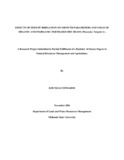Please use this identifier to cite or link to this item:
https://cris.library.msu.ac.zw//handle/11408/2143| Title: | Effects of deficit irrigation on growth parameters and yield of organic and inorganic fertilized dry beans (phaseolus vulgaris l). | Authors: | Khumalo, Mthabisi | Keywords: | Dry beans Deficit irrigation |
Issue Date: | 2016 | Publisher: | Midlands State University | Abstract: | Organic manure supply to soil with inorganic or on its own is good soil management practice improving crop quality and overall soil fertility. Increasing water demand on many sectors and evident reduction of water allocated to agriculture is of importance prompting exploration of the more efficient water use techniques to maximise production. Local small holder communal farmers are faced by challenges of lack of access to inorganic fertilizers due to economic constrain and lack of capital hence they usually utilise the farm yard manure as a nutrient source for their crops. The study intends to evaluate the effects of organic and inorganic fertilizer with water deficit of 20%, 30% and a control with full irrigation on the bean (Phaseolus vulgaris L) crop production (germination, growth parameters and yield component). Six treatments replicated four times were used on the trial. The field experiment was carried out at Midlands State University experimental field from August to November 20l6. Cattle manure was used as organic manure at rate of 24 tonnes/ha on planting and inorganic fertilizer was supplied in split application of compound D at 300kg/ha rate on planting and top dressing ammonium nitrate (34.5% N) at rate of l50kg/ha. The parameters measured in the investigation are germination rate, plant height, and leaf area, number of days taken to flower, pod development and yield. The results shows that 30% water deficit retarded crop development, caused poor flowering and pod development for both organic and inorganic fertilized treatments. Using the yield coefficient (ky) method proposed by Darenbos and Kassim (l979), it was observed that at peak water stress (30% water deficit) high value of ky (l.l4) and very low yields were attained. At the same growth stage low value of ky (0.07) were obtained with relatively high yield for full irrigation and 20% water deficit treatments, thus farmers can use water deficit of 20% under water shortages and shun the 30% water deficit as it produced very low yields on both organic and inorganic treatments. Full water irrigation and 20% deficit had no significant different yield outcome, which brings us to the conclusion that any of the two nutrients supplicants can be utilized with 20% water deficit where water is limiting and full irrigation where there are no shortages. | URI: | http://hdl.handle.net/11408/2143 |
| Appears in Collections: | Bsc Land And Water Resources Management Honours Degree |
Files in This Item:
| File | Description | Size | Format | |
|---|---|---|---|---|
| MTHABISI KHUMALO R132675G FINAL PROJECT.pdf | 1.06 MB | Adobe PDF |  View/Open |
Page view(s)
302
checked on Mar 2, 2026
Download(s)
204
checked on Mar 2, 2026
Google ScholarTM
Check
Items in MSUIR are protected by copyright, with all rights reserved, unless otherwise indicated.



